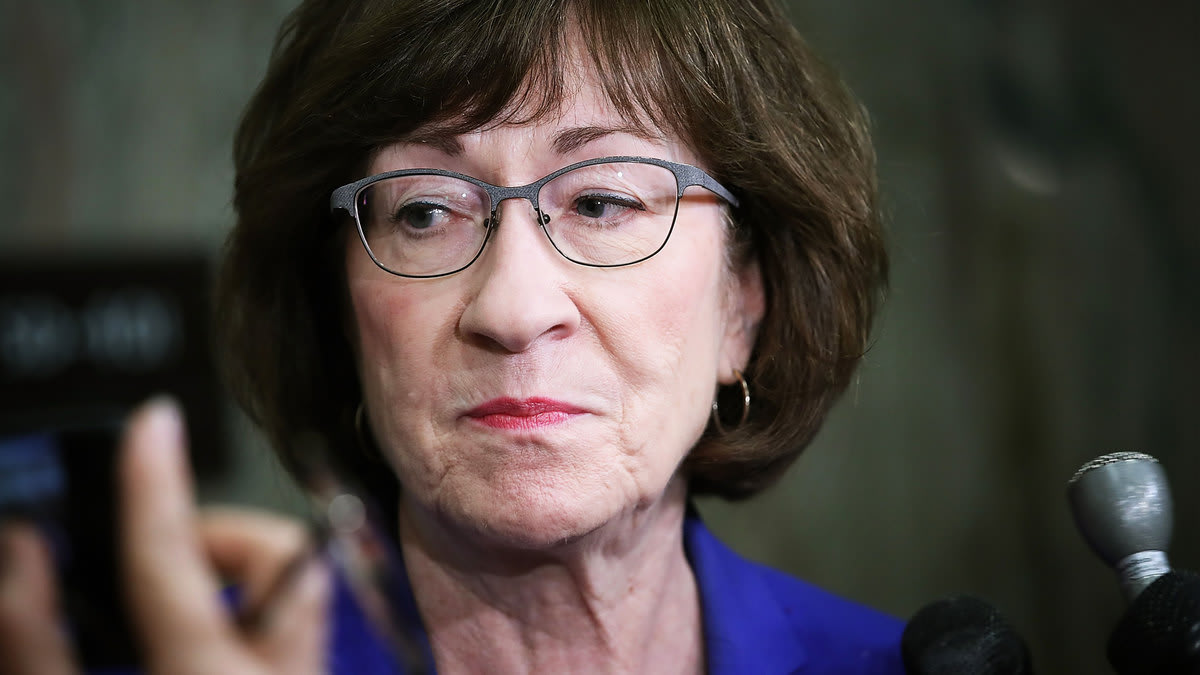Senator Susan Collins is fighting for her political life with a new television ad that says “in a time of crisis, real leaders step forward. Others disappear.”
The ad touts that the Maine Republican co-wrote the Paycheck Protection Program that’s provided $2.5 billion in forgivable loans to more than 26,000 small businesses in the state. It doesn’t mention that she also allowed special interests and big donors to access the Paycheck Protection Program, or PPP.
All it took was three little words.
Collins acknowledged in a radio interview on Maine broadcaster Mike Violette’s radio show Wednesday morning that she was one of the senators who’d worked to include an exception in the bill that allowed big hotel and restaurant chains to receive PPP money as long as they had fewer than 500 employees “per physical location.”
Noting that the initial draft of the PPP did not have that “carve-in” for chains, Common Cause’s Beth Rotman, an expert in money and politics, told the Daily Beast, “Essentially a combination of wealthy special interests together with well-placed contributors at a critical moment bought a revision to our stimulus package that defined small business as including big business because they owned large franchises made up of hundreds of smaller entities. They were following the law they helped write.”
An examination of contributions to Collins for Senator, and to her leadership PAC, during the first quarter of 2020 reveals $13,000 in contributions in mid-to-late February from the American Hotel and Lodging Association PAC, the Hilton Worldwide PAC, and the International Franchise Association.
Those contributions—a fraction of the money she’s raised is this cycle—came before the PPP bill was under consideration, as the economic damage the virus would inflict became clear in March. After the bill was passed later that month, hotel and restaurant chains of all sizes moved quickly to secure the forgivable loans, sparking public outrage. A Pennsylvania investment firm that owns the Ritz-Carlton Coconut Grove in Miami applied for as many as 48 of the taxpayer-backed loans, according to the Orlando Sentinel.
At the end of April, the CEO of the American Hotel & Lodging Association co-wrote an op-ed for the Bangor Daily News with the CEO of Hospitality Maine, declaring that “Maine hoteliers, and the industry at large, are lucky to have Collins advocating on our behalf” and stopping just short of endorsing her re-election bid as Maine’s tourist industry struggles to adapt to COVID-19.
Collins’ office did not respond to a request for comment for this story.
In her interview with Violette on Wednesday morning, Collins said that “ I was able to get an exception included in the bill. And I think it’s made a real difference to some of our restaurants and hotels in Maine that are locally owned and needed that kind of relief.”
Florida Senator Marco Rubio, who also pushed for those three little words, had tweeted on Monday, April 20 that his legislative intent was to help small franchisees, and that the Treasury Department should correct the imbalance.
Nobody disputes that the hotel industry has been especially hard hit by the pandemic—nine times worse than it was after 9/11, according to the op-ed in the Bangor Daily News. But the issue with the PPP was about who should get emergency funding from the government, and who were the free riders. Some like Shake Shack and the LA Lakers that took money quickly returned it, shamed by the publicity. The Treasury Department issued new guidelines to emphasize that companies with access to capital in ways that small businesses do not have should back away from the government trough, though not all of those companies have backed away.
According to The Washington Post, publicly traded companies received more than $1 billion in PPP funds meant for small businesses. They included 43 companies with more than 500 workers, and several recipients “prosperous enough to pay executives $2 million or more.”
By releasing an ad crediting herself as the creator of the PPP, Collins is betting that voters in Maine will remember the good things about it: that the government acted quickly and was able to set aside partisan feelings to get money to people that needed it.
She’s hoping voters won’t blame her for the fact that so many of the loans went to big businesses with deep pockets instead of the mom-and-pop businesses she likes to tout.

